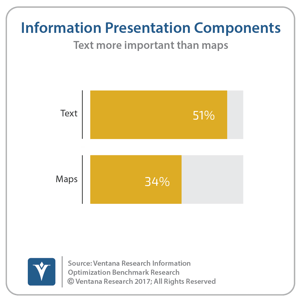We at Ventana Research recently published our research agendas for 2018. Analytics and business intelligence are evolving and so is our research on their use across practice areas. Earlier research has shown that analytics can deliver significant value to organizations; for example, our predictive analytics research shows that 57 percent of organizations reported achieving a competitive advantage and half created new revenue opportunities with predictive analytics. Waves of investment in self-service analytics have propelled the market for analytics tools, significantly empowering line-of-business organizations to create their own analytics and set their own analytic priorities. But organizations are also beginning to recognize some of the limitations of current analytics implementations – for self-service, for  example. Our Data Preparation Benchmark Research reveals that fewer than half (42%) of organizations are comfortable allowing business users to work with data not prepared by IT. Our research this year will continue to explore both the successes and challenges organizations face as they continue to use analytics and BI.
example. Our Data Preparation Benchmark Research reveals that fewer than half (42%) of organizations are comfortable allowing business users to work with data not prepared by IT. Our research this year will continue to explore both the successes and challenges organizations face as they continue to use analytics and BI.
Drilling down into specific ways analytics and BI are evolving, we are seeing more and more natural-language processing (NLP). NLP provides a way to make analytics more accessible because most users have the ability to use the written or spoken word as a user interface. A type of NLP called natural-language generation delivers analytic outputs as narratives rather than charts and tables. I have written about the value of natural-language generation previously. Natural-language query is another type of NLP that enables users to type or speak their queries using conversational language rather than a highly structured syntax. We recently provided an introduction to NLP in this webinar and we’ll be conducting more research on this topic.
Organizations can also embed analytics to make them more accessible to end users. Historically, BI and analytics predominantly were delivered via stand-alone technologies separate from the operational systems that generated the data used in the analytical process. As BI platforms have evolved, most vendors have invested in application-programming interfaces that enable programmers to embed analytics within other applications. These applications can be off-the-shelf applications purchased from a vendor or custom-built.
Collaboration technologies also make analytics more accessible. Because of the widespread use of social media technologies, people have become comfortable sharing information and commenting on it. Social media has also trained people to rate what is rapidly becoming known as “content” and the systems and services that supply it. This same approach can be applied to analytical content – that is, information derived from analytics – not only delivering it via collaboration streams but rating and commenting on it as well, adding more value and creating more context so information is better understood. Our Analytics and BI Value Index will assess vendor capabilities in the areas of embedded and collaborative analytics.
The internet of things (IoT) also continues to influence several aspects of analytics. As more and more devices include data-collection capabilities, organizations have ever-increasing volumes of data that can be used to analyze manufacturing processes, customer interactions and all types of business operations. Our IoT Benchmark Research shows that 46 percent of organizations consider low latency or very low latency essential to their IoT efforts as it enables analysis in real- or near-real-time. These constant streams of data into organizations are intensifying the need for streaming analytics, which we will examine this year as well.
But perhaps the most visible change in analytics use is the widespread deployment of artificial-intelligence and machine-learning technologies. I’ve been working in this area for 20 years and this is clearly the greatest penetration of these capabilities I’ve seen in that time. We are researching some of these issues now in our Machine Learning Dynamic Insights. Our prior research has highlighted a shortage of the skilled resources needed to implement these technologies, with 62 percent of organizations citing it as their main reason for dissatisfaction. Machine learning promises to help reduce, but not eliminate, the need for skilled resources.
We’ll be studying these issues and more throughout the year. Please download and review our full Analytics research agenda. I invite you to participate in this research as we conduct it during the year. I look forward to sharing the insights we discover and helping your organization apply those insights to its business needs.
Regards,
David Menninger
SVP & Research Director
Follow Me on Twitter and Connect with me on LinkedIn.











